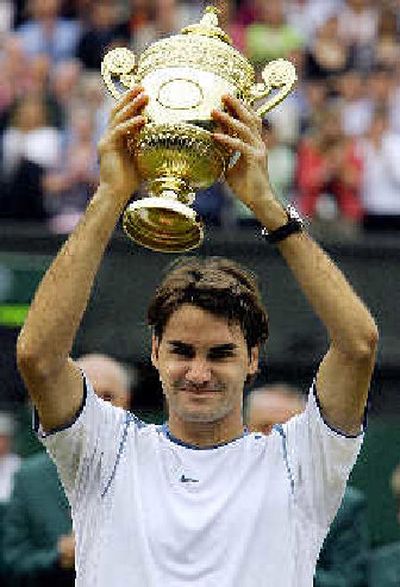Fantastic finish for Federer

WIMBLEDON, England – Roger Federer felt tense before facing Andy Roddick in the Wimbledon final and jittery during it, his right arm shaking, his heartbeat rising.
Or so Federer says.
We’ll have to take his word for it because there wasn’t a hint of anything but cool confidence from Federer while crafting a 6-2, 7-6 (2), 6-4 victory over Roddick on Sunday to become just the third man since 1936 to win three consecutive singles titles at the All England Club.
In a rematch of the 2004 Wimbledon final, Federer used a full assortment of creative strokes to paint his latest tennis masterpiece on the sport’s most prestigious canvas and claim his fifth title in the last nine Grand Slams.
“It’s hard for him because I really played a fantastic match – one of the best of my life,” said Federer, the first man in 50 years to win his first five major finals.
“Today it seemed liked I was playing flawless. Everything was working.”
He finished with 49 winners and 12 unforced errors, an unheard-of ratio. He out-aced Roddick 11-7. He broke Roddick four times.
Roddick charged the net early, coming in behind second serves, chipping and charging, using deep approach shots. But it didn’t take long for the No. 1-ranked Federer to calibrate his passing shots, and he finished with 16.
“I’m not going to sit around and sulk and cry. I did everything I could,” the second-seeded Roddick said. “I tried going to his forehand and coming in. He passed me. I tried going to his backhand and coming in. He passed me. Tried staying back. He figured out a way to pass me, even though I was at the baseline.”
Federer’s performance, filled with “How’d he do that?” moments, left everyone gushing. Even Federer made reference to how he’s “dominating the game.”
Three-time Wimbledon champion Boris Becker said: “We are watching greatness unfold.”
John McEnroe breathlessly told NBC’s viewers: “People think I’m kidding or that I’m just talking him up when I say he’s the greatest talent of all time, but I believe that.”
Playing the best brings out Federer’s best.
He’s 9-1 against Roddick and has won eight straight matches against Lleyton Hewitt, including Friday’s semifinal.
Federer is at a level where his competition lies not with the Roddicks and Hewitts, but the greats of the past.
The Swiss star joined Bjorn Borg (1976-80), Pete Sampras (1993-95, 1997-00) and Fred Perry (1934-36) as the only men in the last 90 years to triumph at Wimbledon three years in a row.
Federer’s grass-court winning streak is 36 matches, second only to Borg’s 41.
“He’s really quite a genius,” said Federer’s coach, Tony Roche, “especially on grass.”
Federer is a little more than a month shy of his 24th birthday, just like Sampras was when he won the fifth of his record 14 major titles.
Then there’s this remarkable statistic: Federer has won 21 straight finals; the previous record was 12, shared by McEnroe and Borg.
Poor Roddick. On grass the past three seasons, he’s 32-0 against everyone else and 0-3 against Federer.
Roddick’s record-setting serve and forehand were good enough to win the U.S. Open and reach No. 1 in 2003, and he’s added plenty to his game since then, improving his backhand, returns and volleying.
“It’s tough knowing that you’re a better player than you were two years ago,” Roddick said, “but not having a lot to show for it.”
To his credit, he never packed it in, and with help from a backhand down the line, Roddick broke for a 2-1 lead in the second set, then punched the air three times.
Won’t see that from Federer. There’s no way to tell from his body language whether he won or lost a point. He walks along the baseline, perhaps flicking a bead of sweat from his brow or tucking strands of hair into his white bandanna.
Inside, though, he’s churning.
“I knew the importance of this one, so I was pretty tense going into it,” Federer said. “Then when I started to serve for the match … I really got nervous.”
Sure, Roger.
As nervous as you were down a break in the second set?
Federer broke back to 3-all with two terrific shots. Roddick followed a second serve to the net and hit a crisp volley, but Federer slid over for a forehand pass. Then Federer stretched to return a 120 mph serve and forced Roddick to sail a backhand long.
Later, Roddick hit a tremendous return, followed by a sharp shot. His reward? Yet another passing shot off Federer’s racket.
“It deflates you and it puts more pressure on you,” Roddick said, “because you feel like, ‘OK, if I’m playing points like that, maybe I have to try to do something better.’ I don’t know if I can.”
When he pushed a forehand into the net to fall behind 5-2 in the tiebreaker, Roddick spiked his racket. That’s something Federer was known to do as a junior, but his persona has matured along with his game.
“He’s just become so solid mentally,” Roddick said.